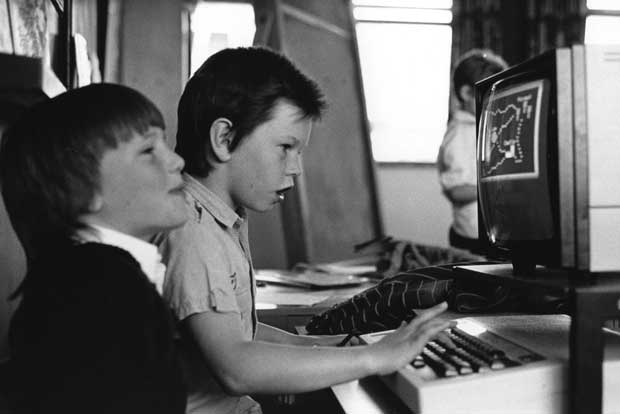Ah, happy memories of the 1990s classroom. The flicker of the CRT screen; the interactive whiteboard; the screeching from the dial-up internet modem; the frantic searching for the Encyclopedia Britannica CD-Rom. These images are now as archaic as the blackboard and the slide rule. Gone are the boxy computers under a dust sheet in the corner. They’ve been replaced by hordes of gadgets, now mostly in the hands of the pupils. Walking into a classroom today is like visiting an Apple Store.
The role of technology in schools has evolved in three phases. It all began in the 1980s with the arrival of the BBC Micro and the affordable personal computer. These shiny wonder machines provided useful diversion for excited pupils and confused teachers. In the 1990s, the computers became bigger, more colourful and easier to use, but their role in the classroom barely altered. Even the addition of the odd ISDN line and flaky internet connection did not bring computers out of their lonely corner.
The second phase was the introduction of the dreadful subject of ICT, or Information and Communications Technology. The concept of coaching pupils to use computers for everyday tasks was sensible, but barely anybody knew what they were doing. ICT lessons were often taught by non-specialist teachers who didn’t like or understand their subject, so they blindly followed the manual. PowerPoint slides and clipart images were used to bore pupils into submission, even though most of them could have worked out the whole course for themselves, given the chance. Instead of incubating a generation of computer-literate youngsters, ICT instead turned them off technology. Good thing that Michael Gove has removed it from the new national curriculum.
The third phase is the one schools have entered today. Computers and curriculum now have a symbiotic relationship. Thanks to Moore’s law, which states that the power of computing doubles approximately every two years, pupils now hold more technological power in their hands than an entire school had 30 years ago. Tablets and iPads are ubiquitous, with one for every pupil in some cases. Lessons can be recorded and distributed as podcasts. Notes and teaching materials are stored online through virtual learning environments, fully accessible from home. ICT is being replaced with more sophisticated computing or computer science courses.
The Girls’ Day School Trust (GDST), a network of 24 independent schools in England and Wales, prides itself on pioneering teaching methods and making the most of what technology can offer. Kevin Stannard, the GDST’s director of innovation and learning, says that we are entering a golden age.
‘Oddly enough it’s not the tradition [of our schools] that has acted as the obstacle,’ he says. ‘It’s the state of technology. We’ve been constantly told we’ve been on the cusp of a revolution, and it’s never been realised. But now technology has got to the stage where it can begin to add real educational value.’
Computers are becoming cheaper and more powerful, but what practical advantage does that bring to teaching? For the GDST schools, the rise in smaller laptops and tablets has been key.
‘One-to-one computing [one device for every student] is what has made all the difference. Learners are using computers to enhance their learning, not teachers to enhance teaching,’ says Stannard.
GDST schools are using the internet to make it easier to learn foreign languages. Year 10 pupils at the Central Newcastle High School have joined forces with counterparts in Paris through Skype. They share content on agreed topics — exchanging audio files about their hobbies, for instance. It beats speaking French to a classmate who has no better grasp of the language than you have. Teachers on both sides of the Channel have found the girls’ listening and speaking skills have improved dramatically.
But unfettered access to technology in the classroom poses challenges too. Keeping pupils focused on the subject they are supposed to be researching can be a constant struggle when Facebook and other social networking sites are just a click away.
The recent case of Hannah Smith, the schoolgirl driven to suicide by the abuse she received online, has highlighted the threat that the internet can pose to young people. Schools have two options: to absolve themselves of responsibility by blocking social networks, or to tackle the potential problems by instilling a sense of responsibility. GDST has gone for the latter approach, and so far it has been successful.
‘We are very keen with the girls at GDST schools to stress the protocol that should be adopted in using social media,’ says Stannard. ‘We’ve done a lot of work on acceptable-use agreements that pupils sign up to, with different versions for different age groups. They understand what is acceptable, and what isn’t.
‘Girls are particularly susceptible to social pressures and presenting themselves in certain ways online and we thought we needed to bring that to their attention.’
Hopefully, the future of education in the classroom will not only be about protecting children from the nastier aspects of the net. As the benefits of technological integration become more obvious, schools will inevitably spend more time, energy and money acquiring the best possible equipment.
Thanks to their flexibility and willingness to innovate, independent schools can lead the way when it comes to using technology to learn. Students can truly become their own teachers, as long as they have teachers who are willing and able to show them how.
From the Spectator’s Independent Schools supplement September 2013






Comments